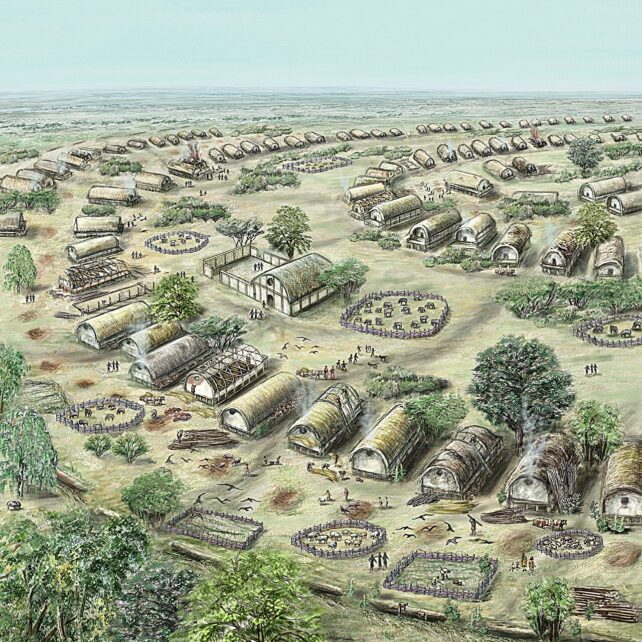I thought this was an interesting article, and it makes sense to me. People today don't realize how much the Industrial Revolution changed our diets. Sweets, red meat... traditionally all of those were festival or celebration/special occasion foods. Now, we can buy candy and red meat whenever we want, it is readily available all year round. This is why western Christians (Catholics) didn't eat meat on Fridays, because meat was considered celebratory food, and Fridays were days of solemnity---but paradoxically, it wouldn't have been readily available to them anyway, centuries ago.
From Science Alert:
Cattle in The Earliest European Cities Weren't Bred as Food
 Illustration of a mega city of Trypillia culture. (Susanne Beyer/Kiel University)
Illustration of a mega city of Trypillia culture. (Susanne Beyer/Kiel University)
07 January 2024
By CARLY CASSELLA
The earliest cities in Europe were built on the foundations of a mostly vegetarian diet, according to new research. The findings suggest that even with the dawn of agriculture and large, planned settlements, meat was but a delicacy.
The gigantic circular cities of the Trypillia culture emerged around 6,000 years ago in what is now Ukraine and Moldova.
The largest of these mega sites covered an area equivalent to several hundred football fields of land and once housed up to 15,000 people. They were larger than any other settlements in the world at the time, rivaling even the cities of ancient Mesopotamia that would soon follow in the Fertile Crescent.
Feeding each and every mouth in Trypillia society required "extremely sophisticated food and pasture management," says paleoecologist Frank Schlütz, who led the study at the Christian-Albrechts-University in Germany.
But even though cattle were a crucial part of the system, beef wasn't.
Between 4200 and 3650 BCE, animals domesticated by Trypillia societies were prized largely for their poop, not their flesh, according to Schlütz and his team.
An analysis of nitrogen isotopes in teeth, bones, and soil from the remains of Tryphillia societies suggests that early farmers in Europe were mostly consuming peas, lentils, and cereal grains, like barley.
Cattle, sheep, and goats, which were kept in fenced pastures, were largely used to fertilize farmland. These animals also ate peas and grains, and their manure boosted the production of later crops.
Slaughtering the herds for meat would have depleted a vital resource after much labor raising them, collapsing the whole system.
Previously, some scientists had assumed there was intensive meat production in Trypillia societies, based on the estimated size of their herds. But that may not be true after all.
Animal products contributed just 8 to 10 percent of the regular Trypillia diet, according to Schlütz and his team.
"We hypothesize that there would have been days during which only meat was consumed," the authors write, as well as "some everyday meat consumption, preferably from small animals".
When crops and soil are fertilized by manure, biological turnover is increased, resulting in higher nitrogen isotope levels overall.
This is how scientists determined that the crop yields of pea seeds and broad beans, found in the soil of Trypillia sites, were probably improved with "high levels of manuring, over long periods, on small plots close to houses and stables."
[...]
Read the rest here:
Cattle in The Earliest European Cities Weren't Bred as Food



